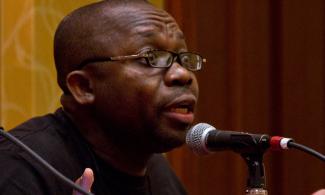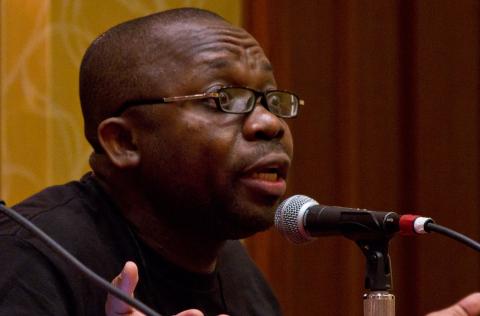
To locate the alleged Facebook posts beyond the limits of religious freedom, and to consider them criminal and as comments that insult or incite contempt of Islamic religion shows poor judgment and understanding of religious diversity and the constitutional provision on freedom of religion or belief.
While waiting for the police to formally charge or release Mubarak Bala, it is important to critically examine a key proposition in the complaint filed against him at the Kano State Police Command.
This is necessary to understand the intent and motivation of the petitioners as well as implications for religious freedom in the country. The complainants claimed that Mubarak Bala made comments on Facebook that were "provoking" and "annoying" to Muslims.
Meanwhile, Nigeria is not a Muslim country. Nigeria is a nation of Muslims and non-Muslims. The petitioners alluded to posts where Mr. Bala allegedly called the prophet of Islam "denigrating names" such as "pedophile" and "terrorist". They suggested that these comments could make Muslims take laws into their hands or react in a way that would lead to public disturbance or a breach of public peace.

The petitioners alluded to sections 38 of the Nigerian Constitution 1999 as amended, which guarantees the right to freedom of religion and conscience. However, they noted that the right to freedom of religion or conscience was not absolute and drew attention to section 45 of the constitution that potentially limits the exercise and expression of the right to freedom of religion on grounds of public safety and order. The petitioners made it clear that the said posts contravened section 210 of the Penal Code of Kano State which prohibits publicly insulting or seeking to incite contempt of any religion, in this case, Islam.
Given that the petitioners are lawyers, the tendency is to assume that the petition is legally sound and contains grounds to prosecute and convict Mr. Bala. Unfortunately it is not. In this piece, I argue that the said Facebook posts constitute a legitimate exercise of freedom of religion and conscience as guaranteed in the Nigerian constitution. I am of the view that the posts are not expressions in contempt of the Islamic religion as the petitioners imputed.
While I understand clearly that the alleged Facebook posts infuriated the petitioners and some other Muslims. And based on this, they would want Bala imprisoned or killed, I submit that those comments that he made do not exceed the bounds of freedom of conscience. The statements are innocuous and could not lead to any breach of public peace and order except in a society characterized by Islamic jungle justice. Why do I say so?
First of all, let us take a look at the constitutional provision on religious freedom. Section 38(1) of the Nigerian constitution states: "Every person shall be entitled to freedom of thought, conscience, and religion, including the freedom to change his religion or belief, and freedom (either alone or in community with others, and in public or in private) to manifest and propagate his religion or belief in worship, teaching, practice, and observance"
Now as the complaints rightly noted in their petition, Bala has the constitutional right to freedom of religion or belief. But they missed the point in thinking that the alleged Facebook posts were not an exercise in freedom of religion or belief but actions in contempt of religion.
Look as the petitioners noted, Mubarak Bala was born into a Muslim family but later he changed his religion and became an atheist. In other words, Mr. Bala is not a Muslim. He exercised his right to change his religion and belief. Unfortunately, the petitioners could have clearly understood that Bala's change of religion -his becoming an atheist- has implications on how he thinks about religions including Islam. Just as a change from atheism to Islam would change how one's perceives atheism and unbelief.
The complainants should have realized that Bala's renunciation of Islam has implications, and marks a shift in his perception of Islam including his understanding of Islamic teachings and practices. Bala's change of religion and his embrace of atheism entails a change in the way he views the prophet of Islam, the way he thinks about the Qur'an. So holding a different view of the prophet of Islam is Bala's right and entitlement. The petitioners and other Muslims should respect this. if the petitioners acknowledged Bala's right to change religion and adopt a different view of Islam and the prophet, then how does the said comment fall outside the bounds of religious freedom as provided in the constitution.
I can imagine that the complainants overlooked or discounted the part of section 38(1) which states that everybody is entitled to "freedom (either alone or in community with others, and in public or in private) to manifest and propagate his religion or belief in worship, teaching, practice, and observance".
If they had considered it, they would not have filed this petition. The alleged Facebook posts are public manifestations of Bala's changed religious views and perspectives. His comments are public expressions and propagation of his different thoughts about the prophet of Islam. They are consistent with an unbeliever's outlook of the prophet. Muhammad is a prophet as well as a historical figure, who existed in time and space. So Muhammad could be seen from different -prophetic and non prophetic perspectives by muslims and non muslims.
The petitioners have a flawed understanding of section 38(1) of the Nigerian constitution because while they agreed that Bala has the right to freedom of thought conscience and religion, and is entitled to change his religion or belief, they refused to acknowledge the fact that Bala has, as contained in that section, the right to propagate in private or public, different or other views of the prophet or Islam. This is where their thesis that freedom of thought conscience and religion is not absolute, which the complainants used to build their case against Bala, literally collapsed.
To propose that the said posts could result in public disturbance and breach of public peace is mistaken because such a proposition views public order strictly in relation to Muslims-some muslims- who do not respect the constitution, human rights and the rule of law. Such a position regards public peace in connection with those who view Muhammad as a prophet, while excluding others who hold different notions of the prophet and of Islam.
To locate the alleged Facebook posts beyond the limits of religious freedom, and to consider them criminal and as comments that insult or incite contempt of Islamic religion shows poor judgment and understanding of religious diversity and the constitutional provision on freedom of religion or belief.
Free Mubarak Bala.